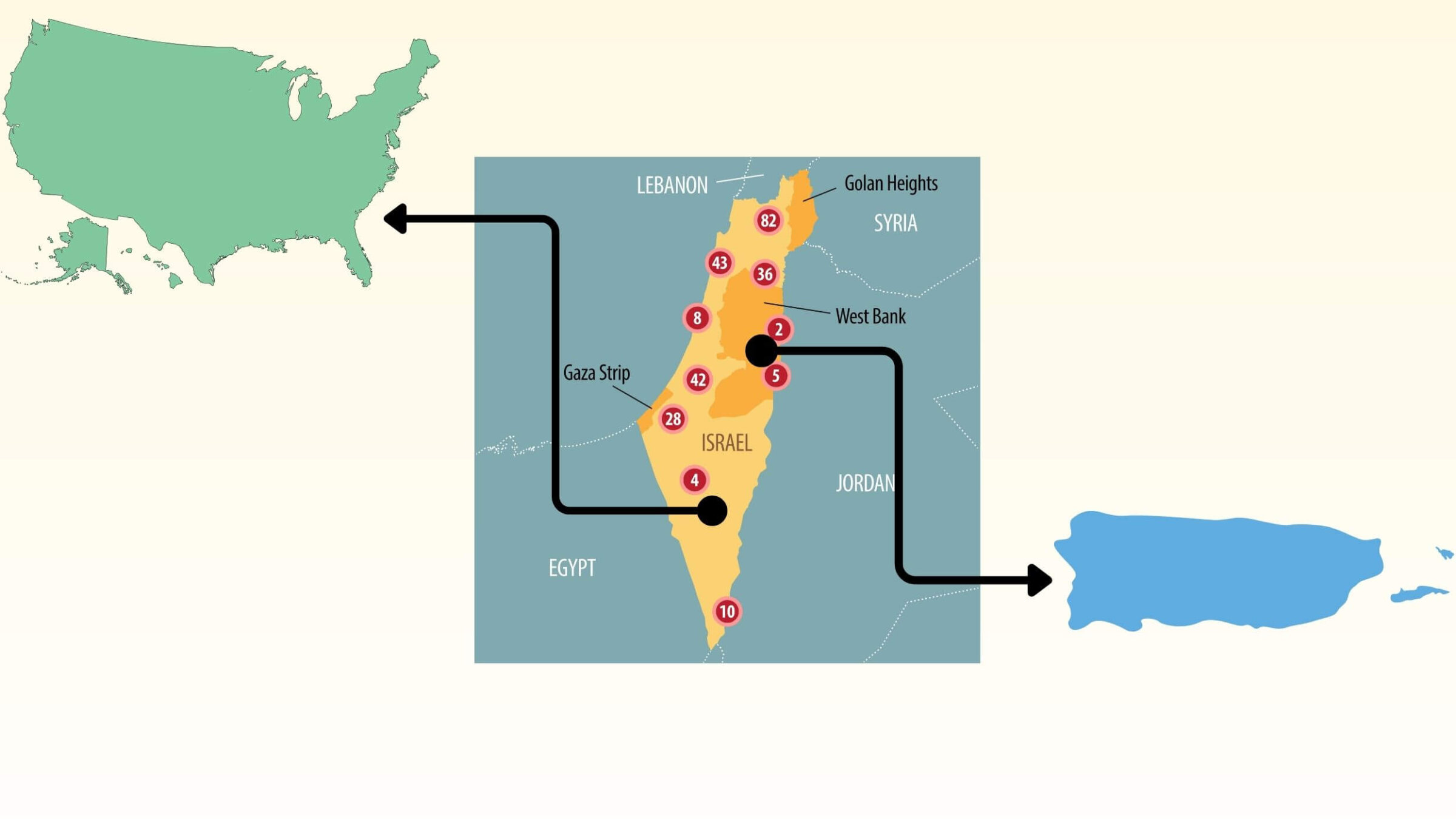No, the West Bank can’t be to Israel what Puerto Rico is to the US
The far-right’s new favorite proposal has some glaring flaws, starting with the question of citizenship

Graphic by Forward Graphics/Canva
If President Donald Trump keeps his promise, he’ll announce next week whether he plans to bring an end to the United States’ long-standing opposition to Israel’s potential unilateral annexation of the West Bank. What he says could electrify and complicate Israeli politics, risk a new conflagration with the Palestinians, and reshape the political map in the Middle East.
But one of the central examples that Israel’s far-right and their American allies have seized on in arguing for annexation just shows how flawed the idea of annexation is. “Even the United States has Puerto Rico, in which the people have some representation, they certainly have civil rights, but they are not considered equal citizens,” Malkah Fleisher, a blogger and settler, asserted during a debate in which I was a participant this week on ILTV.
I lived in Puerto Rico for three years on assignment for the Associated Press. That comparison — of which Trump’s former ambassador to Israel, David Friedman, has become a high-profile proponent — doesn’t hold up.
First and foremost, Puerto Ricans are American citizens, full stop. Every person born on the island is automatically a U.S. citizen. They are not able to vote in presidential elections while residing on the island, and they are not represented by voting members in Congress, which has led to allegations of unequal treatment. But their citizenship is not conditional. There is no concurrent Puerto Rican citizenship.
Yet proponents of the Israeli right argue that Israel can annex the West Bank while denying Palestinians the political rights that come with citizenship in a democracy. If Israel were to truly follow the Puerto Rico model, every Palestinian living in annexed territories would become an Israeli citizen, with all of the rights and responsibilities that entails.
Yes, all. Because even with the disenfranchisement experienced by Puerto Rican voters on their home island, Puerto Ricans have every right to move to any of the 50 U.S. states, establish residency, and vote like any other American citizen. By doing so, they immediately gain full representation, including the right to vote for president and to elect senators and voting members of the House of Representatives.
This is exactly what happens in practice. Millions of Puerto Ricans have moved to the 40 states, where they are fully enfranchised. And if a U.S. citizen from the mainland moves to Puerto Rico and does not maintain residency in another state, they correspondingly lose their right to vote in federal elections. I experienced this firsthand during the 2000 U.S. presidential election. As a mainlander living in Puerto Rico, I didn’t vote. This rule applies equally to all U.S. citizens, regardless of their origins.
The same situation applies to other U.S. territories like the U.S. Virgin Islands, Guam, and American Samoa, affecting about 1% of American citizens at any given time. Any of them can move to the mainland or Hawaii, and immediately gain full voting rights. The disenfranchisement is geographical, not ethnic or racial.
That truth poses a profound problem for Israelis who advocate the Puerto Rico model. Because an Israel that gave Palestinians in the West Bank the ability to vote if they moved to Israel would be an entity nearly equally divided between Jews and Arabs — equally, if Gaza’s residents are given the same treatment. That’s a scenario in which the Jewish state starts to look a whole lot less Jewish — effectively the opposite outcome from what the far-right wants.
And, in fact, no Israeli politician is suggesting that Palestinians in Jenin should gain Israeli citizenship and be able to move to Tel Aviv to vote in Israeli elections. Instead, they envision the West Bank being annexed into Israel without its Palestinian populace gaining the ability to vote in Israeli national elections. This would effectively create a two-tier system of governance that is fundamentally undemocratic.
Some proponents of annexation suggest that Palestinians could be given “autonomous” self-rule or local voting rights, much like a municipal council. But this is not equivalent to the U.S. territories model, where residents are American citizens and have the option to fully participate in the political system. Instead, this would codify a form of permanent political subjugation. It would create a system where one group of people has full political rights, while another group — living under the same sovereignty — does not.
It’s improbable that Israel will annex the entire West Bank — which is known to many Israelis as Judea and Samaria, and contains a half million settlers amid the nearly 3 million Palestinians — just because Trump allows it. There would be too much local opposition. A likelier outcome would be annexation of certain areas where settlers live close to the border. This is no long-term solution, either.
Israel faces difficult choices about its borders, its identity, and its relationship with the Palestinians. If Israel wants to annex the West Bank, or any part of it, it must be prepared to grant full citizenship and voting rights to the people who live there — something like the true Puerto Rico model.
















